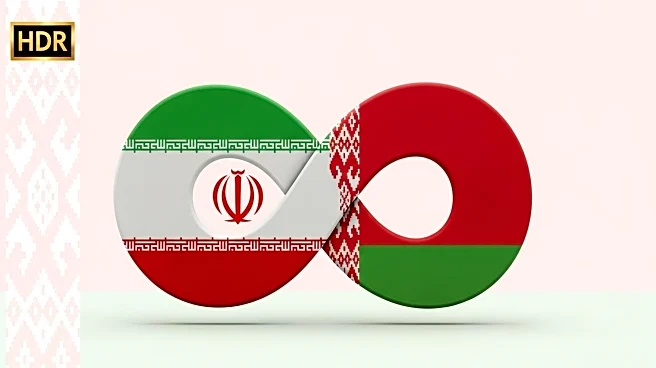What is the story about?
What's Happening?
Iran and Belarus have signed 12 cooperation documents during a visit by Iranian President Masoud Pezeshkian to Belarus, aimed at enhancing collaboration in politics, tourism, media, investment, and special economic zones. The visit follows previous high-level exchanges and is part of a broader strategy to deepen bilateral relations. The two countries have been cooperating in scientific and technical fields, including medicine, nanotechnology, and energy. They have also established trade offices to reduce reliance on the U.S. dollar and increase the use of local currencies. The partnership is rooted in a strategic cooperation agreement from 2007, which provided Belarus access to Iranian oil and Tehran benefited from Minsk's nuclear expertise.
Why It's Important?
The strengthening of ties between Iran and Belarus is significant in the context of their geopolitical positioning and shared interests in countering Western influence. Both countries face economic and political pressure from the West, prompting them to seek closer cooperation. The partnership could lead to increased economic exchanges and technological collaboration, benefiting both nations. Additionally, their alignment within multilateral organizations like the Shanghai Cooperation Organization and BRICS reflects a strategic shift towards Asia, potentially altering regional dynamics and influencing global power structures.
What's Next?
Iran and Belarus are likely to continue expanding their cooperation, focusing on areas such as defense, trade, and technology. The recent agreements may lead to further joint initiatives and projects, enhancing their economic and political ties. Both countries may also seek to strengthen their roles within multilateral organizations, using these platforms to advance their interests and counter Western influence. The evolving partnership could attract attention from other nations, potentially leading to new alliances and collaborations.
Beyond the Headlines
The deepening relationship between Iran and Belarus highlights the broader trend of countries seeking alternative alliances amidst geopolitical tensions. This partnership underscores the importance of strategic cooperation in navigating international challenges and pursuing national interests. The focus on reducing reliance on the U.S. dollar and increasing local currency use reflects a growing trend among nations to mitigate the impact of Western sanctions and financial pressures.
















